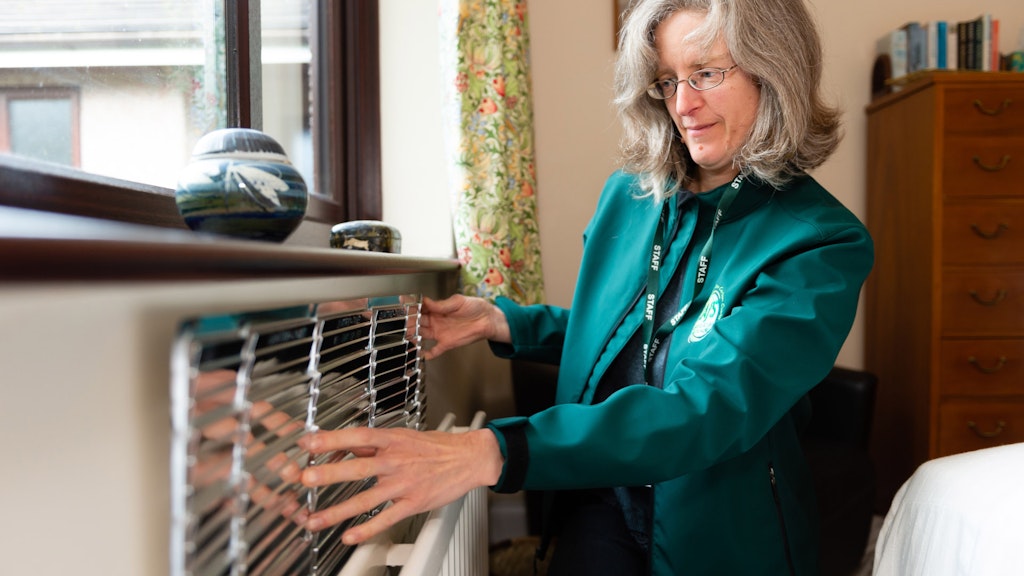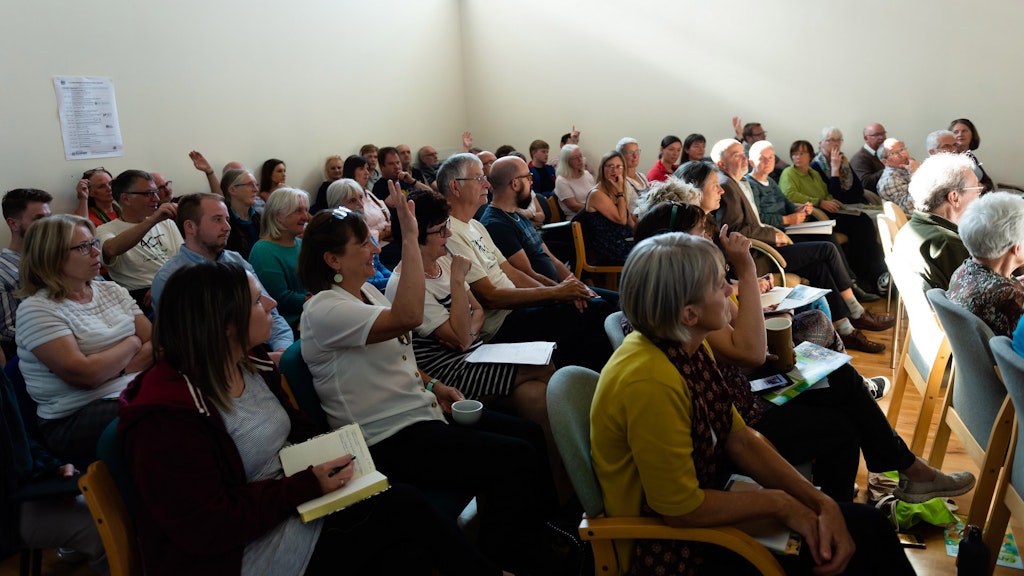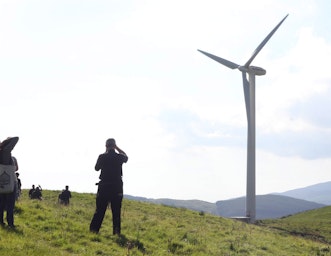
Gearing up to support community level change
January 6, 2020Home » Gearing up to support community level change
How can Zero Carbon Britain help with on-the-ground action? Hazel Graham introduces a pioneering project that’s having real impact at a local level and providing a template for others to follow.
Cumbria Action for Sustainability (CAfS) is a registered charity and company that’s been operating for 20 years. Its vision is a zero carbon Cumbria that brings about a better way of life in balance with the environment. Its 12 paid part-time staff and a small pool of volunteers run projects in the county to motivate, inspire, enable, advise and support people and organisations to reduce their greenhouse gas emissions and live in a more sustainable way.
CAfS has consciously aligned its mission to CAT’s Zero Carbon Britain project, distilled down to a local level, and is guided by the Zero Carbon Britain principle that we already have the technology we need to transition to net zero. Its projects aim to normalise these solutions.
With no ‘core’ government funding, projects are often influenced by the availability of grants and contracts. But CAfS has a clear vision, a five-year business plan and prioritises the highest impact sources of emissions that it can realistically have an impact on. It also factors in its strengths and skills, and the actions that others are taking in the county, so as to support and not duplicate effort.
CAfS’ projects have touched on virtually all main sources of local carbon emissions, from food and transport to buildings, waste and energy production – many of the Zero Carbon Britain topics in ‘powering down’ and ‘powering up’.
The scale has ranged from one-off talks, workshops or film screenings through to a £1 million ‘whole-place’ approach to transform the long-term sustainability of a community. CAfS is perhaps best known for its work in a few key areas of emissions: the built environment and community energy.
Buildings
As Zero Carbon Britain shows, retrofitting existing buildings for energy efficiency and tightening the regulations for building energy use are central to the UK’s path to net zero.
Achieving this demands action from individual property owners as well as within the construction industry and the planning and building control frameworks. Recognising this, and recognising that there is a need for low carbon skills and knowledge to be shared as widely as possible, CAfS has supported and upskilled people at all these levels through its projects and services, including:
- Its annual Cumbria Green Build & Sustainable Living Festival (the first in the country, in its 14th year in 2019), offering a month-long programme of green open homes, site visits, workshops and training courses showcasing low carbon technologies and lifestyles.
- Technical training for construction professionals and homeowners in low energy new builds and retrofits, including CPD-certified courses up to Level 4.
- Thermal imaging.
- Energy audits for buildings.
- Schemes to install draught-proofing measures and offer energy advice.
Some of these are free via funding, while others are paid for by the client. CAfS contracts out some services to trusted local partners, with others carried out in-house by specialist staff.
Community energy
Zero Carbon Britain spells out the need to shift away from fossil fuels and shows that local generation of power from renewables must be a significant part of the UK’s energy mix. CAfS has strived to develop community owned renewable energy in Cumbria to harness its many benefits for the area – from generating income for community projects, to bringing people together and making it possible for schemes to go ahead that may not have done with private investment.
CAfS used its charity reserves to seed fund Community Energy Cumbria, supporting this new organisation to set up community owned renewable energy schemes, including hydro and solar power. CAfS has used its expertise to manage share offers for several community groups, raising almost £1 million.
Integrating small-scale generators into the electricity distribution network is a big challenge for network operators, along with enabling the shift to electric vehicles. CAfS has built a strong partnership with its local operator, Electricity North West, by sitting on its sustainability advisory board and co-hosting several events looking at electricity distribution in a low carbon future.

Influence and reach
Community organisations can be the bridge that brings others together on a theme like climate change – something that will be crucial for local areas striving to reach net zero. CAfS is increasingly influencing development across the county, as an enabler of change as well as a visionary body and delivery organisation.
For example, in 2019, CAfS chaired Cumbria’s first summit on climate change for leaders in the private, public and third sectors and is helping to drive high-level partnership working to rapidly decarbonise the county.
Keys to success
CAfS has managed to survive, thrive and stay true to its vision through periods of funding cuts and reduced interest in climate change.
It’s been possible for three main reasons, which are linked:
- The clarity of purpose and ability to articulate a clear, long-term, positive vision for a zero carbon Cumbria, using Zero Carbon Britain to influence priorities for work and fundraising.
- The organisation’s success in sourcing grants and contracts for paid services, based on its reputation.
- Having paid staff to lead the organisation, communicate its work effectively and deliver projects, and competitive recruitment for strong trustees.
Lessons for local groups from CAfS’ experience
- Use Zero Carbon Britain to influence what you do on a local level.
- Work out the priorities for your area. This will be a mix of opportunism and strategy, balancing what needs doing, what you can get funding for and the skills available.
- Tackle the sources of carbon emissions that individuals, local businesses, communities or local authorities have direct control over.
- Share your expertise as widely as possible – train others and build a strong base of local knowledge. Support people to bring about the changes they want to see.
- Capitalise on current interest in climate change to engage local experts who weren’t involved before.
- Consider the co-benefits of carbon reduction actions, as these can open up more funding (e.g. fuel poverty), but stay true to your purpose.
- Identify your gatekeepers – organisations that hold the funds, or with whom you need to partner.
- Understand that there will be limits to what you can achieve operating on a local basis, but maximise your impact within these limits.
Perhaps most importantly, do not give up. The science is crystal clear, the solutions are available and local groups have the potential to play a pivotal role in bringing people together and guiding action, as local authorities and others begin turning to them. Groups have weathered the storm through periods of low public interest but the clouds are breaking.
Now is the time for environmental groups to gear up, keep climate change on the agenda, and ensure that they can respond when their moment comes.

About the author
Hazel is Chief Executive of Cumbria Action for Sustainability and a climate jobs campaigner with 20 years’ professional experience of transformative emissions reduction and social justice programmes.
About Cumbria Action for Sustainability
CAfS is a registered charity and company based in Penrith, striving towards its vision of a zero carbon Cumbria with a better way of life in balance with the environment. Formed in 1998, it empowers people, communities and organisations by managing and delivering projects and sharing knowledge, practice, skills, networks and practical experience.
www.cafs.org.uk
- Zero Carbon Britain
- Climate Change
- News Feed
Related Topics
Related Pages
Related events


Renewables for Households: Solar Hot Water
18th May 2024


